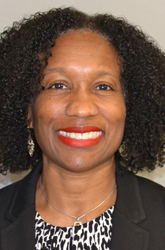Issues & Answers Special Advertising Section:
May 2021

Jennifer Jackson
Chief Financial Officer
Munich Re Trading LLC

Raghuveer Vinukollu
Senior VP, Natural Catastrophe Solutions
Munich Re US

Jackson: Climate justice is actually a new concept, but it essentially is the idea that adverse impacts in weather are not felt equitably among all people. In the United States, this environmental injustice includes climate change, and it impacts communities of color and communities that are not of a certain economic status in a disproportionate way, hence the concept of climate justice.
Why is climate justice important?Jackson: It’s important because it’s an aspect of human rights and development needed to achieve this human-centered approach. What we want to do and the reason why this is important is because we want to make sure that there are options and opportunities available to individuals who are adversely impacted by these changes in climate. The insurance industry has an enormous opportunity to bridge the gap between how these climate changes impact certain communities—in particular, those of underserved communities.
How is the NAACP Environmental and Climate Justice group working to address this problem?
Vinukollu: The NAACP Environmental and Climate Justice group is doing tremendous work to ensure that communities are equipped to engage in sustainability and climate action planning that integrates policy and practices. This organization together with Munich Re US are focusing on developing long-term solutions. Communities of color and low-income communities bear the brunt of the impacts of unhealthy, energy-inefficient and disaster-vulnerable buildings. We support the NAACP on its centering equity in the sustainable building sector. We envision a future in which they proactively enforce sustainable building policies and practices that produce equitable access opportunities, treatment impacts and outcomes for all, regardless of their identity or status. That’s really important.
Vinukollu: Munich Re has been thinking long and hard about both the topic of climate change and about closing the protection gap. This is really important for long-term resiliency of communities. We think that Munich Re plays an important role in this global effort to mitigate and adapt to climate change. At Munich Re, we have the knowledge and expertise that can help communities become more resilient by focusing on increasing the insurance takeup rate and closing the insurance gap so that we can reduce the risk, along with the help of innovative loss prevention measures and new risk transfer solutions that meet the needs of the underserved and underprivileged communities. We believe that a public-private partnership is a perfect approach to do that. We can raise awareness around the policies needed to reduce the impact of climate change and advance a society that fosters sustainable, resilient communities that uphold all rights of all people. We think that as we address this topic of closing the protection gap, and how can we have a sustainable future and adapt to the changing climate, we have to think as a whole, holistically, and not just a certain section of the population.
Munich Re desires to work together with others in and outside the insurance industry to develop innovative community-based solutions for closing the protection gap for vulnerable populations, helping protect them from the adverse effects of climate risk, and providing the resources to allow them to recover from catastrophic disasters.